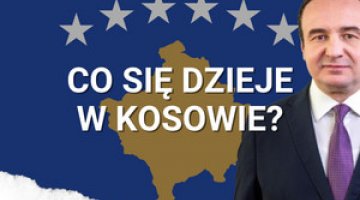Kosovo (almost) independent
On 10 September the International Civil Office (ICO) and the International Civil Representative (ICR) ended their missions. This translates into the formal closure of the period of Kosovo's “supervised independence”. However, in reality international community will still have tools to influence the Kosovar government as the EU and NATO missions – the civilian EULEX and military KFOR, which ensure the introduction of reforms and the maintenance of internal security respectively – will remain in Kosovo. Kosovo is also dependent on economic assistance provided by the EU and the international financial institutions. A further dynamic of introducing reforms in Kosovo will to a large extent hinge on the determination and involvement of the EU which will monitor this process but which is currently unable, due to internal divisions, to come up with a coherent strategy towards Kosovo. The change in the nature of the international presence will not cause a wider international recognition of the state. Besides Serbia, five EU member states (including four NATO member states) do not recognise Kosovo's independence, as well as Russia and China. The burning issues which remain are: unregulated relations between Kosovo and Serbia, the lack of control over a part of the Kosovar territory inhabited by the Serbian minority and the poor prospects for the country's economic development.
The termination of the missions
The ICO and ICR were subordinate to the International Steering Group (ISG) established by the countries which recognised Kosovo's independence (including the US, Turkey and 20 EU member states Their main task was to supervise the implementation of the premises of the Comprehensive Proposal for the Kosovo Status Settlement prepared by Finnish diplomat Martti Ahtisaari (the ‘Ahtisaari plan’) and to coordinate actions undertaken in Kosovo by the international community. The ICR obtained the right to recall officials and annul decisions made by the government which are not in line with democratic principles and the regulations of the Ahtisaari plan. The ICR was also entitled to appoint its representatives to such institutions as the Constitutional Court, the Kosovo Judicial Council, the Supreme Court, the Board of Privatisation Agency of Kosovo and it could appoint an Auditor General.
In the opinion of the ISG members of June 2012, Kosovo fulfilled all conditions necessary in order to finalise the supervision process. A constitution was voted in and the laws which regulate the state's institutional system according to the Ahtisaari plan were adopted. These include the introduction of regulations which guarantee the autonomy and rights of national minorities (among them 10 seats in the 120-seat parliament), the implementation of decentralisation by transferring substantial competences to local governments. The problems which remain unresolved either exceed the competences of the Kosovar government and depend on the good will of a third party (most often Serbia) or require long-term measures.
The new formula of control
Despite the formal termination of the supervision, two international missions will remain in Kosovo, the EU’s EULEX and NATO’s KFOR missions which respectively ensure the implementation of the reforms relating to the rule of law and the maintenance of internal security. The UN’s UNMIK mission, which operates on the basis of the UN Security Council resolution, is still present in the Kosovo.
The closure of the ICR means a decreasing influence on the situation in the state for the US and Turkey – the main proponents of Kosovo's independence and the ultimate takeover of responsibility for Kosovo by the EU which supervises EULEX and especially whose member states (e.g. Germany) which have the largest impact on the operation of KFOR.
It may be expected, however, that the competences of the ICR in the area of monitoring the implementation of the Ahtisaari plan will be in part taken over by the US embassy which will still have ascendancy over the policies of the Kosovar government due to a network of informal connections but it is the EU that will have political responsibility for the further process of building the state.
EU member states, thanks to EULEX and KFOR and the enlargement policy and annually published reports on the implementation of democratic reforms, have instruments of exercising pressure on the local government. However, it should be underlined that the EU’s range of influence will depend on whether it establishes a real offer of integration for Kosovo. There is a risk that the EU, which is divided and suffering from an economic crisis, will pay little attention to the situation in the currently relatively stable Kosovo and will not use the tools available to shape foreign and internal policy in Kosovo. This model of action will contribute to hampering the reform process and may result in the stability of the whole region being threatened in the long term.
Challenges and opportunities
One of the main challenges Kosovo is facing is the normalisation of its relations with Serbia which consistently refuses to recognise Kosovo's independence and is undertaking measures to hinder the functioning of this country (e.g. it does not recognise documents, makes it impossible to transport goods and persons, blocks Kosovo's membership in regional organisations). These strained relations result in Pristina being unable to control the Kosovo North which is inhabited by the Serbian minority, supported by Belgrade. The chances of reaching agreement with Serbia seem to be getting smaller since a new coalition in Serbia came to power this year. The new government in Belgrade is more and more often emphasising the need to replace discussions focused on technical issues, which were intended to facilitate the smooth functioning of both states which do not recognise each other (e.g. regulations on the mutual recognition of documents and university degrees, the transmission of electricity etc.), by political dialogue. This may result in the reopening of such questions as the changing of the borders, the rights of the Serbian minority or even Kosovo's independence. The policy pursued by Belgrade is being met with an increasing resistance from society and the Kosovar elite which is beginning to challenge the principles of a multiethnic state and a wide range of rights granted to national minorities. In the opinion of society, concessions made to the Serbian minority have not produced expected results or caused a change in Belgrade's approach to Kosovo. The further development of these tendencies may lead to migration or even an outbreak of a new conflict between Albanians and Serbs.
A second problem faced by the government in Pristina is the recognition of the state's independence by permanent members of the UN Security Council (China and Russia) and some EU and NATO member states (Spain, Romania, Greece, Slovakia, Cyprus). This has closed the door for Kosovo to the membership in international organisations and for it to engage in treaties with the EU and NATO. Although Pristina has been accepted into the International Monetary Fund and the World Bank, the way to other organisations remains closed.



